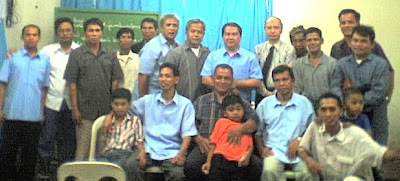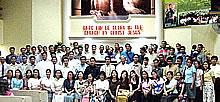I have previously written about the desirability and necessity of registering local Baptist churches with the Securities and Exchange Commission. I subsequently wrote about sample Constitutions and by-laws which local churches can use instead of the SEC-issued forms. In this post, I will discuss:
- Registering a church as a religious society or aggregate
- Provisions of the Corporation Code of the Philippines on religious society or aggregate
- Powers and capacity of a corporation
- Revocation of SEC registration for non-submission of annual reportorial requirements
- Church registration with SEC good only for 50 years; how to extend the term
- Consequences for a church losing its legal personality through expiration of corporate term or revocation of SEC registration
- What is the difference between a deacon and a trustee?
- Practical difficulties with a religious society or aggregate
- What is a corporation sole?
- Can a non-Filipino pastor, bishop, elder, etc. be a corporation sole?
- In a corporation sole, if the church buys real property, who will be registered in the title as the owner?
- Practical problems with a corporation sole
- Does the concept of the corporation sole conflict with the Baptist distinctive of congregational church government?
- Provisions of the Corporation Code of the Philippines on corporation sole
A church can be registered with the SEC as a religious society or aggregate (multiple directors, with minimum of five). Posted below are the provisions of BP 68 “Corporation Code of the Philippines” on religious society/aggregate:
Sec. 116. Religious societies. - Any religious society or religious order, or any diocese, synod, or district organization of any religious denomination, sect or church, unless forbidden by the constitution, rules, regulations, or discipline of the religious denomination, sect or church of which it is a part, or by competent authority, may, upon written consent and/or by an affirmative vote at a meeting called for the purpose of at least two-thirds (2/3) of its membership, incorporate for the administration of its temporalities or for the management of its affairs, properties and estate by filing with the Securities and Exchange Commission, articles of incorporation verified by the affidavit of the presiding elder, secretary, or clerk or other member of such religious society or religious order, or diocese, synod, or district organization of the religious denomination, sect or church, setting forth the following:Powers and capacity of a corporation
1. That the religious society or religious order, or diocese, synod, or district organization is a religious organization of a religious denomination, sect or church;
2. That at least two-thirds (2/3) of its membership have given their written consent or have voted to incorporate, at a duly convened meeting of the body;
3. That the incorporation of the religious society or religious order, or diocese, synod, or district organization desiring to incorporate is not forbidden by competent authority or by the constitution, rules, regulations or discipline of the religious denomination, sect, or church of which it forms a part;
4. That the religious society or religious order, or diocese, synod, or district organization desires to incorporate for the administration of its affairs, properties and estate;
5. The place where the principal office of the corporation is to be established and located, which place must be within the Philippines; and
6. The names, nationalities, and residences of the trustees elected by the religious society or religious order, or the diocese, synod, or district organization to serve for the first year or such other period as may be prescribed by the laws of the religious society or religious order, or of the diocese, synod, or district organization, the board of trustees to be not less than five (5) nor more than fifteen (15). (160a)
Sec. 36 of BP 68 Corporation Code of the Philippines enumerates the powers and capacity of a corporation:
Every corporation incorporated under this Code has the power and capacity:Non-submission of annual reportorial requirements leads to revocation of SEC registration
1. To sue and be sued in its corporate name;
2. Of succession by its corporate name for the period of time stated in the articles of incorporation and the certificate of incorporation;
3. To adopt and use a corporate seal;
4. To amend its articles of incorporation in accordance with the provisions of this Code;
5. To adopt by-laws, not contrary to law, morals, or public policy, and to amend or repeal the same in accordance with this Code;
6. In case of stock corporations, to issue or sell stocks to subscribers and to sell stocks to subscribers and to sell treasury stocks in accordance with the provisions of this Code; and to admit members to the corporation if it be a non-stock corporation;
7. To purchase, receive, take or grant, hold, convey, sell, lease, pledge, mortgage and otherwise deal with such real and personal property, including securities and bonds of other corporations, as the transaction of the lawful business of the corporation may reasonably and necessarily require, subject to the limitations prescribed by law and the Constitution;
8. To enter into merger or consolidation with other corporations as provided in this Code;
9. To make reasonable donations, including those for the public welfare or for hospital, charitable, cultural, scientific, civic, or similar purposes: Provided, That no corporation, domestic or foreign, shall give donations in aid of any political party or candidate or for purposes of partisan political activity;
10. To establish pension, retirement, and other plans for the benefit of its directors, trustees, officers and employees; and
11. To exercise such other powers as may be essential or necessary to carry out its purpose or purposes as stated in the articles of incorporation.
Some pastors and churches think that they do not have to do anything else once they have registered with the SEC. Please take note that the SEC requires all registered corporations to submit annually certain requirements (audited financial statement, names of elected officers, etc). The SEC imposes penalties for non-submission of these requirements. The total amount of penalties is commensurate with the number of years the church has not submitted its reportorial requirements. One pastor I know told me that his church has been penalized Php 50,000.00 for its non-submission of the reportorial requirements for the last five years.
The SEC revokes the certificate of registration of a church as a religious corporation if it fails to file the reportorial requirements and pay the penalties. Two Baptist pastors have told me that since their churches could not pay the penalties, they have opted to register their respective churches as new corporations.
Church registration with SEC good only for a period of 50 years; how to extend the term
Section 11 of BP 68 Corporation Code of the Philippines states:
Sec. 11. Corporate term. - A corporation shall exist for a period not exceeding fifty (50) years from the date of incorporation unless sooner dissolved or unless said period is extended. The corporate term as originally stated in the articles of incorporation may be extended for periods not exceeding fifty (50) years in any single instance by an amendment of the articles of incorporation, in accordance with this Code; Provided, That no extension can be made earlier than five (5) years prior to the original or subsequent expiry date(s) unless there are justifiable reasons for an earlier extension as may be determined by the Securities and Exchange Commission.Please take note that Section 11 does not distinguish as to private corporation, educational corporation, religious corporation, stock or non-stock corporation. It simply states that “A corporation shall exist for a period not exceeding fifty (50) years from the date of incorporation unless sooner dissolved or unless said period is extended.” Section 116 also does not provide that a religious society or aggregate is exempt from the coverage of Section 11.
(Please take note also that prior to 1980 when BP 68 Corporation Code of the Philippines became effective, the governing law for corporations was Act 1459 which became effective on April 1, 1906. Act 1459 provided for a maximum non-extendible corporate term of 50 years. However, Republic Act 3531 amended Section 18 of the Corporation Law, allowing domestic private corporations to extend their corporate life beyond the period stated by the articles of incorporation for a term not exceed 50 years in any one instance. This amendment is now part of Section 11 of BP 68.)
The 50-year period starts upon the issuance to the church of the certificate of registration as a religious corporation by the SEC. If a church registered with the SEC is nearing the end of its 50-year term, it should therefore file for extension. The filing can be done as early five years before the end of the 50-year term. (Some of the pioneer Baptist churches in the Philippines were registered with the SEC in the 1950s and 1960s; they should take note of this 50-year limit and take the necessary steps.)
Consequences if the church as a religious corporation loses its legal personality through revocation of SEC registration or failure to file for extension of its corporate term; winding up period of three years
As Section 11 provides, the church as a religious corporation will lose its status as an SEC-registered corporation and its legal personality as such. As a consequence of losing its legal personality, the church as a religious corporation (or any corporation for that matter) will lose its powers and capacities under Section 36.
Under Section 122 of BP 68, however, the church as a religious corporation (like any other corporation) has a three-year period from the end of its corporate term to “wind up” its corporate affairs. The said section states:
Sec. 122. Corporate liquidation. - Every corporation whose charter expires by its own limitation or is annulled by forfeiture or otherwise, or whose corporate existence for other purposes is terminated in any other manner, shall nevertheless be continued as a body corporate for three (3) years after the time when it would have been so dissolved, for the purpose of prosecuting and defending suits by or against it and enabling it to settle and close its affairs, to dispose of and convey its property and to distribute its assets, but not for the purpose of continuing the business for which it was established.Please take note that this “winding up” period of three years is for settling and closing the affairs of the church as a religious corporation (I will discuss below the distinction between the church as an SEC-registered corporation and as a Biblical institution). As the Supreme Court ruled in the 1968 case of Alhambra Cigar & Cigarettes Manufacturing Inc. vs. SEC (24 SCRA 269), the three-year period is for the final closure of the corporation’s affairs. The period is specifically for:
At any time during said three (3) years, the corporation is authorized and empowered to convey all of its property to trustees for the benefit of stockholders, members, creditors, and other persons in interest. From and after any such conveyance by the corporation of its property in trust for the benefit of its stockholders, members, creditors and others in interest, all interest which the corporation had in the property terminates, the legal interest vests in the trustees, and the beneficial interest in the stockholders, members, creditors or other persons in interest.
Upon the winding up of the corporate affairs, any asset distributable to any creditor or stockholder or member who is unknown or cannot be found shall be escheated to the city or municipality where such assets are located.
Except by decrease of capital stock and as otherwise allowed by this Code, no corporation shall distribute any of its assets or property except upon lawful dissolution and after payment of all its debts and liabilities.
(1) Prosecuting and defending suits by or against it and enabling it to settle and close its affairs; andWhat will happen if the church as a religious corporation failed to file for extension of its corporate term and the three year period for winding up either lapsed without its knowledge or without complying with Section 122? Well, as Section 122 states, the properties of the corporation can possibly be escheated in favor of the town or city where the properties are located. This means that the properties of the corporation will now become the properties of that town or city. Escheat proceedings are governed by Rule 91 of the Rules of Court.
(2) Disposing of and conveying its property and to distribute its assets to trustees for the benefit of stockholders, members, creditors, and other persons in interest, but not for the purpose of continuing the business for which it was established.
What will happen to the properties of the church if it is dissolved or loses its legal personality?
Religious corporations (whether religious society or aggregate or corporation sole) are classified as non-stock corporations. Subject to the three-year winding up period under Section 122 of the Corporation Code as discussed above, the church must comply with Sections 94 and 95:
Sec. 94. Rules of distribution. - In case dissolution of a non-stock corporation in accordance with the provisions of this Code, its assets shall be applied and distributed as follows:In terms of properties donated to the church, either paragraph (2) or (3) of Section 94 will apply. The terms and conditions of the Deed of Donation must be looked into to determine which sub-paragraph applies.
1. All liabilities and obligations of the corporation shall be paid, satisfied and discharged, or adequate provision shall be made therefore;
2. Assets held by the corporation upon a condition requiring return, transfer or conveyance, and which condition occurs by reason of the dissolution, shall be returned, transferred or conveyed in accordance with such requirements;
3. Assets received and held by the corporation subject to limitations permitting their use only for charitable, religious, benevolent, educational or similar purposes, but not held upon a condition requiring return, transfer or conveyance by reason of the dissolution, shall be transferred or conveyed to one or more corporations, societies or organizations engaged in activities in the Philippines substantially similar to those of the dissolving corporation according to a plan of distribution adopted pursuant to this Chapter;
4. Assets other than those mentioned in the preceding paragraphs, if any, shall be distributed in accordance with the provisions of the articles of incorporation or the by-laws, to the extent that the articles of incorporation or the by-laws, determine the distributive rights of members, or any class or classes of members, or provide for distribution; and
5. In any other case, assets may be distributed to such persons, societies, organizations or corporations, whether or not organized for profit, as may be specified in a plan of distribution adopted pursuant to this Chapter. (n)
Sec. 95. Plan of distribution of assets. - A plan providing for the distribution of assets, not inconsistent with the provisions of this Title, may be adopted by a non-stock corporation in the process of dissolution in the following manner:
The board of trustees shall, by majority vote, adopt a resolution recommending a plan of distribution and directing the submission thereof to a vote at a regular or special meeting of members having voting rights. Written notice setting forth the proposed plan of distribution or a summary thereof and the date, time and place of such meeting shall be given to each member entitled to vote, within the time and in the manner provided in this Code for the giving of notice of meetings to members. Such plan of distribution shall be adopted upon approval of at least two-thirds (2/3) of the members having voting rights present or represented by proxy at such meeting. (n)
(Please take note that under the New Civil Code of the Philippines, donations worth more than five thousand pesos or of real property are required to be in writing. Also, I have mentioned elsewhere that mother churches should consider setting terms and conditions in donating real property to their daughter churches or mission works. Such terms and conditions must however must take into consideration the Baptist distinctive of the autonomy of local churches.)
If the church as a religious corporation loses its legal personality through the expiration of its corporate term or through revocation of its SEC certificate of registration, is it no longer a church?
Here we have to make distinctions between the church as a Biblical institution and as an SEC-registered religious corporation.
Section 122 of BP 68 states that if a corporation has been dissolved “… it shall nevertheless be continued as a body corporate for three (3) years after the time when it would have been so dissolved, for the purpose of prosecuting and defending suits by or against it and enabling it to settle and close its affairs, to dispose of and convey its property and to distribute its assets, but not for the purpose of continuing the business for which it was established.” Thus in the cases of “Buenaflor vs. Camarines Sur Industry Corp” (108 Phil 472) and “Cebu Port Labor Union vs. States Marine Corp” (101 Phil 468), the dissolved corporations were not allowed to continue their business (selling ice and shipping respectively) during the three-year winding up period. Can the same be true of an SEC-registered church that has lost its legal personality through non-extension of its corporate term or revocation of its registration?
The Supreme Court decisions on the matter of corporate dissolution have involved private corporations engaged in business activities and not religious corporations. The SEC registration is a prerequisite before business licenses by various government agencies or offices can be issued. Without such registration, therefore, business licenses could not longer be issued or remain valid.
The activities of a church, on the other hand, are evangelism, worship and missions, for which no government licenses are required or necessary (unlike in some countries like Bangladesh or Restricted Access Nations). As I noted in my Legal Updates blog post on registering local Baptist churches with the Securities and Exchange Commission, the church as a Biblical institution can exist even without SEC registration. One reason however why it is desirable or necessary for the church to register with the SEC as a religious corporation is to be able to purchase and own property under its own name, rather than under the name of the pastor or of some members. Without such SEC registration, the property cannot be titled in the name of the church.
Thus, a church that has lost its legal personality through non-extension of its corporate term or revocation of its SEC registration can, as a Biblical institution, continue its “business” of evangelism, worship and missions since no government license is necessary for such activities under the freedom of religion clause of our Constitution. However, as with private corporations engaged in business, the church as a religious corporation can no longer exercise the corporate powers and capacity enumerated under Section 36 of BP 68.
US Supreme Court decision on the two entities of the incorporated church
The United States Supreme Court in 20 AM JUR 2D § Religious Societies 5 (2007) stated:
“In determining the threshold question of the applicability of religious corporation law, a court will look to the provisions of the corporation’s certificate of incorporation as well as the actual practices of the organization as revealed in it papers.What is the difference between a deacon and a trustee?
“A church society, by incorporating does not lose its existence or become wholly merged in the corporation. The religious corporation and the church, although one may exist within the pale of the other, are in no respect correlative. The objects and interests of the one are moral and spiritual; the other deals with things temporal and material. Each as a body is entirely independent and free from any direct control or interference by the other.
“Thus, where is an incorporated church, there are two entities – the one, the church as such, not owing its ecclesiastical or spiritual existence to the civil law, and the other, the legal corporation – each separate, although closely allied. The former is purely voluntary and is not a corporation or a quasi corporation. On the other hand, a corporation which is formed for the acquisition and taking care of the property of the church, must be regarded as a legal personality, and is in no sense, ecclesiastical in its function.”
Deacon is a Biblical officer, the other officer being the pastor (bishop or elder). On the other hand, trustee refers to the officer of the religious society or aggregate as provided by law. Some churches therefore have a board of deacons and, to fulfill the legal requirement, also have a different board of trustees. On the other hand, some churches in the election (or selection) of deacons provide that the deacons will automatically be the trustees.
Practical difficulties with a religious society or aggregate
The practical problems that some churches have with a religious society/aggregate are the difficulty of calling for meetings and of arriving at decisions. At the trivial end, some pastors have said, "Do we still need to have a meeting just to talk about whether we should buy a can of floor wax?" At the other extreme, some churches have been dominated by the board of trustees at the expense of the Biblical leadership of the pastor. (The ideal church, as someone said, is pastor-led, board of trustees-supported, deacon-served and congregationally-approved.)
With a corporation sole, what is being incorporated is not the church itself but the office of the pastor, bishop, elder, etc.
| Update as of June 10, 2017: In registering a corporation sole, the SEC previously used the general format “Pastor (Bishop) of Baptist Church of ________” for the name. For example, you may have “Senior Pastor of Grace Baptist Church” or “Bishop of Faith Baptist Church Metro Manila” as the name of a corporation sole. But recently, the SEC has allowed the use of, for example, “Grace Baptist Church” or “Faith Baptist Church Metro Manila” as the name for the corporation sole. I don't agree with this new SEC policy for two reasons. First, as I discussed, in a corporation sole, it is not the church, but the office of the pastor or bishop that is being incorporated. Second, the new SEC policy causes confusion. For example, with “Senior Pastor of Grace Baptist Church”, you can immediately know that it is a corporation sole. But with the name, for example, of “Grace Baptist Church”, you don't know whether it is a corporation sole or a religious society (aggregate). You need to examine the certificate of registration or inquire with the SEC. |
The corporation sole is the second kind of religious corporation provided under the Corporation Code of the Philippines. There are a lot of misconceptions about what a corporation sole is. For example, one church in Metro Manila states in its website that “the name of the church is Baptist Church of ________ but its corporate name is Senior Pastor of Baptist Church of ________”. Please take note that with a corporation sole, what is being incorporated is not the church itself but the pastor, bishop, elder, etc. (or technically, the office of such religious leader).
Once the pastor, bishop. elder, etc. (or technically his office) has been formed into a corporation sole, he now acts by himself in administering and managing the affairs, properties, etc. of the church. Needless to say, the church itself does not have to register with the SEC although it will have its internal, binding rules for church membership, rights and responsibilities of members and officers, etc. There is no legal or practical point for a church to register as a religious society or aggregate AND at the same time register the office of its pastor as a corporation sole.
Perpetuity of the corporation sole
For example, Pastor “A” who formed the corporation sole dies. Once Pastor “B” the successor to the office of the pastor has been chosen or elected according to the rules of the church, then Pastor “B” is now the corporation sole. This called in law as “perpetuity”. The Supreme Court in “Roman Catholic Apostolic Adm. of Davao, Inc. vs. LRC” (102 Phil. 596, December 20, 1957) citing an American case, said,
“A corporation sole consists of one person only, and his successors (who will always be one at a time), in some particular station, who are incorporated by law in order to give them some legal capacities and advantages, particularly that of perpetuity, which in their natural persons they could not have had.”Please take note that this so-called “perpetuity” does not exempt the corporation sole from the coverage of Sections 11 of BP 68 (50-year corporate term as discussed above).
What if the pastor resigns, retires, or dies? Disputes as to who the rightful corporation sole is
[1] There must be rules as to the succession of the corporation sole: As discussed above, there is perpetuity in the office of the corporation sole. Section 111, paragraph 4 of the Corporation Code of the Philippines requires that the articles of incorporation of the corporation sole must provide for the manner in which any vacancy occurring in the office of chief archbishop, bishop, priest, minister, rabbi or presiding elder is required to be filled, according to the rules, regulations or discipline of the religious denomination, sect or church to which he belongs. Section 114 of the Corporation Code of the Philippines outlines the process of filling vacancies in the office of the corporation sole.
[2] Please read the Supreme Court decision in “Natanael B. Juane, Petitioner, vs. Iglesia Evangelica Metodista En Las Islas Filipinas (IEMELIF), Inc., Respondent, G.R. No. 179404”. In this case, Reverend Natanael B. Juane of the IEMELIF Cathedral in Tondo, Manila contended that the transformation of IEMELIF from a corporation sole to a corporation aggregate was legally defective, and that therefore, he was the corporation sole, not Bishop Nathanael P. Lazaro. The Supreme Court ruled:
Even if the transformation of IEMELIF from a corporation sole to a corporation aggregate was legally defective, its head or governing body, i.e., Bishop Lazaro, whose acts were approved by the Highest Consistory of Elders, still did not change. A corporation sole is one formed by the chief archbishop, bishop, priest, minister, rabbi or other presiding elder of a religious denomination, sect, or church, for the purpose of administering or managing, as trustee, the affairs, properties and temporalities of such religious denomination, sect or church. As opposed to a corporation aggregate, a corporation sole consists of a single member, while a corporation aggregate consists of two or more persons. If the transformation did not materialize, the corporation sole would still be Bishop Lazaro, who himself performed the questioned acts of removing Juane as Resident Pastor of the Tondo Congregation. If the transformation did materialize, the corporation aggregate would be composed of the Highest Consistory of Elders, which nevertheless approved the very same acts. As either Bishop Lazaro or the Highest Consistory of Elders had the authority to appoint Juane as Resident Pastor of the IEMELIF Tondo Congregation, it also had the power to remove him as such or transfer him to another congregation.(In my research with the PRU on corporation sole, I came across the articles of incorporation of a corporation sole which provided in its rules of succession this very amusing provision: “I shall occupy the position of Chief Elder until my death. Upon my death, my position shall be occupied by a person that I will appoint.”)
Can a non-Filipino pastor, bishop, elder, or missionary be a corporation sole?
There are foreigners (Americans, Koreans, etc) who are the chief archbishop, bishop, priest, minister, rabbi or presiding elder of their religious denomination, sect or church. As Baptists, we are all familiar with American missionaries.
[1] The Corporation Code of the Philippines does not state a Filipino citizenship requirement for a pastor, bishop or missionary in becoming a corporation sole. It may therefore be argued that an American or Korean missionary, for example, may register as a corporation sole.
[2] In the case of Roman Catholic Apostolic Adm. of Davao, Inc. vs. LRC, 102 Phil. 596, December 20, 1957, the Supreme Court ruled that a corporation sole with an alien as administrator may acquire private land which is held in trust for the benefit of the faithful residing within its territorial jurisdiction. In this case, the Roman Catholic Apostolic Adm. of Davao, Inc. was a corporation sole organized and existing in accordance with Philippine law, with Msgr. Clovis Thibault, a Canadian citizen, as actual incumbent.
If the church buys a piece of land, who will be registered in the land title as the owner of the property?
Since the church itself is not registered with the SEC and therefore has no legal personality, the title to any land or property it purchases will be registered in the name of the corporation sole (Republic vs. Intermediate Appellate Court, 168 SCRA165, November 29, 1988).
Section 113 of the Corporation Code of the Philippines (posted below) governs the acquisition and alienation of property by a corporation sole. In our example above, the land purchased by the church will be titled in the name of “Senior Pastor of Baptist Church of ________”.
Please take note again that in a corporation sole, the pastor, bishop or elder acts as the trustee and manager of the church's property. In case the pastor dies, the property (in our example, the piece of land) will not be inherited by his heirs. (Please read my post guidelines and precautions in buying church property.)
Can a corporation sole be transformed into a religious society or aggregate?
Yes. The Supreme Court ruled in “IEMELIF et al vs. Bishop Nathanael Lazaro et al”, G.R. No. 184088, July 6, 2010 that such change can be done by mere amendment of its articles of incorporation without the need of going through the process of dissolution.
Practical problems with a corporation sole
[1] Unlike with a religious society or aggregate, the SEC does not have ready-made forms or documents for a corporation sole. A pastor, bishop, chief elder, etc. has to consult a lawyer in drafting the articles of incorporation and other documents like authorization from the congregation, rules of succession, etc. He can also do some research with the Public Reference Unit (PRU) of the SEC and get samples of these documents on file.
[2] Some members of the church might misunderstand what a corporation sole is. They might think that the pastor now owns all the properties of the church.
[3] As the church grows in membership, the pastor will find it more difficult to combine his responsibilities of teaching and preaching with the administration of the church. Some big churches have a pulpit pastor who is responsible only for preaching and teaching, an administrative pastor (the term is self-explanatory), a youth pastor, a pastor for visitation and follow-up, etc.
[4] The pastor, bishop, elder, etc. as a corporation sole acts by himself without having to deal with a board of trustees. If he has a domineering personality or is carnal, he may abuse his authority.
Does the concept of the corporation sole conflict with the Baptist distinctive of congregational church government?
Once the corporation sole has been registered with the SEC, the pastor, bishop or elder as the case may be, now acts by himself (without having to deal with a board of trustees) in managing the affairs, temporalities and properties of the church. But what about the Baptist distinctive of congregational church government? For example, what if a missionary to a foreign field is asking for financial support from the church? Can the pastor as the corporation sole decide all by himself whether to support or not this missionary? If he decides one way or another, isn’t he disregarding this distinctive of congregational form of church government?
Another example: What if the pastor wants an increase in his salary? Can the pastor as the corporation sole decide on this matter by himself or would such require congregational approval?
(It must be noted that some Baptist churches in the Philippines follow what they call a theocratic form of church government, that is, God rules the church through the pastor. One church I know of follows a theocratic form of church government but amazingly is registered with the SEC as a religious society or aggregate.)
For more information about the congregational form of church government, please read “Congregational Church Governance” and “Baptist Congregational Church Governance: A Challenge”.
If a church decides on a corporation sole instead of a religious society or aggregate, here are some suggestions:
[1] Section 111, paragraph 4 of the Corporation Code of the Philippines states that the rules, regulations and discipline of the religious denomination, sect or church are not inconsistent with and do not forbid the formation of a corporation sole. As part of the registration requirements, the pastor must submit either his notarized affidavit or an authorization letter or affidavit from the congregation allowing him to form a corporation sole. If a Baptist church observes the congregational form of church government BUT allows its pastor to form a corporation sole, it must define in the letter or affidavit the limits of the pastor’s authority or what matters require congregational approval.
[2] In the articles of incorporation to be submitted by the pastor to the SEC or in the authorization letter or affidavit, the church’s Articles of Faith, Church Covenant, Constitution and By-laws and other rules and regulations must be stated therein or included as annexes.
Provisions of the Corporation Code of the Philippines on corporation sole
Sec. 109. Classes of religious corporations. - Religious corporations may be incorporated by one or more persons. Such corporations may be classified into corporations sole and religious societies.
Religious corporations shall be governed by this Chapter and by the general provisions on non-stock corporations insofar as they may be applicable. (n)
Sec. 110. Corporation sole. - For the purpose of administering and managing, as trustee, the affairs, property and temporalities of any religious denomination, sect or church, a corporation sole may be formed by the chief archbishop, bishop, priest, minister, rabbi or other presiding elder of such religious denomination, sect or church. (154a)
Sec. 111. Articles of incorporation. - In order to become a corporation sole, the chief archbishop, bishop, priest, minister, rabbi or presiding elder of any religious denomination, sect or church must file with the Securities and Exchange Commission articles of incorporation setting forth the following:
1. That he is the chief archbishop, bishop, priest, minister, rabbi or presiding elder of his religious denomination, sect or church and that he desires to become a corporation sole;
2. That the rules, regulations and discipline of his religious denomination, sect or church are not inconsistent with his becoming a corporation sole and do not forbid it;
3. That as such chief archbishop, bishop, priest, minister, rabbi or presiding elder, he is charged with the administration of the temporalities and the management of the affairs, estate and properties of his religious denomination, sect or church within his territorial jurisdiction, describing such territorial jurisdiction;
4. The manner in which any vacancy occurring in the office of chief archbishop, bishop, priest, minister, rabbi or presiding elder is required to be filled, according to the rules, regulations or discipline of the religious denomination, sect or church to which he belongs; and
5. The place where the principal office of the corporation sole is to be established and located, which place must be within the Philippines.
The articles of incorporation may include any other provision not contrary to law for the regulation of the affairs of the corporation. (n)
Sec. 112. Submission of the articles of incorporation. - The articles of incorporation must be verified, before filing, by affidavit or affirmation of the chief archbishop, bishop, priest, minister, rabbi or presiding elder, as the case may be, and accompanied by a copy of the commission, certificate of election or letter of appointment of such chief archbishop, bishop, priest, minister, rabbi or presiding elder, duly certified to be correct by any notary public.
From and after the filing with the Securities and Exchange Commission of the said articles of incorporation, verified by affidavit or affirmation, and accompanied by the documents mentioned in the preceding paragraph, such chief archbishop, bishop, priest, minister, rabbi or presiding elder shall become a corporation sole and all temporalities, estate and properties of the religious denomination, sect or church theretofore administered or managed by him as such chief archbishop, bishop, priest, minister, rabbi or presiding elder shall be held in trust by him as a corporation sole, for the use, purpose, behalf and sole benefit of his religious denomination, sect or church, including hospitals, schools, colleges, orphan asylums, parsonages and cemeteries thereof. (n)
Sec. 113. Acquisition and alienation of property. - Any corporation sole may purchase and hold real estate and personal property for its church, charitable, benevolent or educational purposes, and may receive bequests or gifts for such purposes. Such corporation may sell or mortgage real property held by it by obtaining an order for that purpose from the Court of First Instance of the province where the property is situated upon proof made to the satisfaction of the court that notice of the application for leave to sell or mortgage has been given by publication or otherwise in such manner and for such time as said court may have directed, and that it is to the interest of the corporation that leave to sell or mortgage should be granted. The application for leave to sell or mortgage must be made by petition, duly verified, by the chief archbishop, bishop, priest, minister, rabbi or presiding elder acting as corporation sole, and may be opposed by any member of the religious denomination, sect or church represented by the corporation sole:
Provided, That in cases where the rules, regulations and discipline of the religious denomination, sect or church, religious society or order concerned represented by such corporation sole regulate the method of acquiring, holding, selling and mortgaging real estate and personal property, such rules, regulations and discipline shall control, and the intervention of the courts shall not be necessary. (159a)
Sec. 114. Filling of vacancies. - The successors in office of any chief archbishop, bishop, priest, minister, rabbi or presiding elder in a corporation sole shall become the corporation sole on their accession to office and shall be permitted to transact business as such on the filing with the Securities and Exchange Commission of a copy of their commission, certificate of election, or letters of appointment, duly certified by any notary public.
During any vacancy in the office of chief archbishop, bishop, priest, minister, rabbi or presiding elder of any religious denomination, sect or church incorporated as a corporation sole, the person or persons authorized and empowered by the rules, regulations or discipline of the religious denomination, sect or church represented by the corporation sole to administer the temporalities and manage the affairs, estate and properties of the corporation sole during the vacancy shall exercise all the powers and authority of the corporation sole during such vacancy. (158a)
Sec. 115. Dissolution. - A corporation sole may be dissolved and its affairs settled voluntarily by submitting to the Securities and Exchange Commission a verified declaration of dissolution.
The declaration of dissolution shall set forth:
1. The name of the corporation;
2. The reason for dissolution and winding up;
3. The authorization for the dissolution of the corporation by the particular religious denomination, sect or church;
4. The names and addresses of the persons who are to supervise the winding up of the affairs of the corporation.
Upon approval of such declaration of dissolution by the Securities and Exchange
Commission, the corporation shall cease to carry on its operations except for the purpose of winding up its affairs. (n)
Note: Jerald Finney, a Baptist and a lawyer, in his book “Separation of Church and State” and in his blog of the same title argues strongly against the incorporation of churches. He states in Chapter 3 of his book:
“A New Testament church cannot be organized according to the principles of both the Bible and civil law. Should a church organize, even partially, according to the principles of civil law, that church cannot also be in conformity to the principles of church organization laid down in the Word of God. For example, a church which incorporates is not a New Testament church.”
Finney’s blog contains a lot more articles of interest for pastors considering whether or not to incorporate their churches or ministries. Biblical Law Center, a ministry of the Indianapolis Baptist Temple under Dr. Greg Dixon, also provides a lot of articles on the issue of non-registration of churches.











